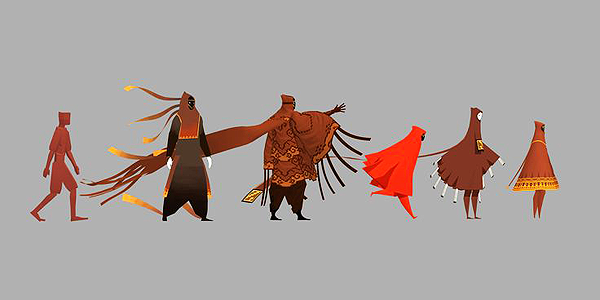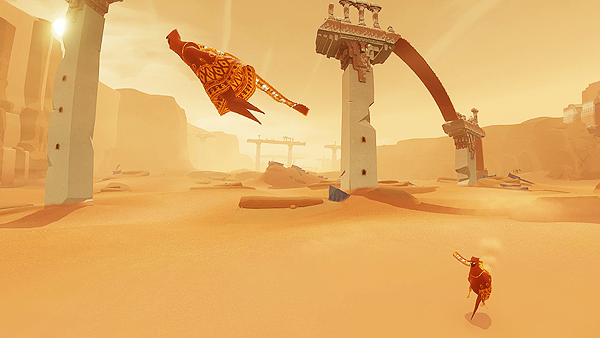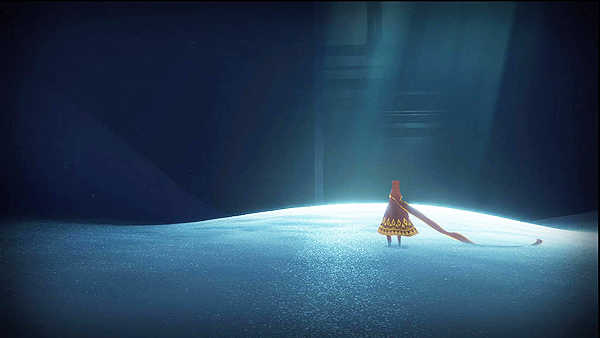For a long time, I have been a part of the “games are art” crowd, and wore my membership like a badge of pride. While games can be silly and fun, there’s a huge spectrum of experiences that only video games can currently provide. No other medium is so good at putting the consumer directly inside of the narrative, and while the games industry as a whole has had some widely-publicized missteps, there’s no doubt in my mind that games will eventually join films and novels in the realm of glorified media.
This hope doesn’t mean that I want all games to be serious. Just as films that buck the norm can get the spotlight at the Oscars (Hello, Mad Max: Fury Road), games that eschew the current trends can often garner critical acclaim. We live in a world where games are more easily produced than ever before — and while this means that there is a lot of sludge churned out by digital markets like Steam on a regular basis — it doesn’t mean that more games is a bad thing.
Take Journey, for example, a game created by the same art director as the recently released Abzû. Journey is a game that I go back to once in awhile to remind myself that however bleak things may become, video games are worth fighting for. While I’ve seen Abzû described as a “zen fish simulator,” Journey was the original meditative experience for me.
Before I started zen trucking with Euro Truck Simulator or finding a strange catharsis in Dark Souls, Journey managed to pack a punch that knocked me off my feet. At first, the game doesn’t feel like it’s anything special. The visuals are pretty, but I was sure that I wouldn’t be able to connect with a game that had no dialogue. It almost seemed like a game that was artsy for the sake of art, but one thing which the Journey team never lost sight of was how it would feel to play the game.
While the visual and sound designs were solid, what Journey excels at is infusing their gameplay with a sense of weightlessness. There are many games where you can fly or glide, but I have never found a game that could top Journey for making it feel like you were there flying as well.
In other games that involve flying or gliding, like Saint’s Row IV, there’s an obvious effort before launching yourself into the air. While there’s a similar build up in Journey, the instant your feet leave the ground, you’re no longer of this earth. You’re a dandelion seed wafting in the air, or a mote of dust that can control its movement.

In Journey, you play the Traveller, who is on a quest to see what a light is on the top of the mountain. You have no idea what will happen when you reach the light or even why it’s so important, but by keeping things simple, the Traveller’s goal becomes your own. The mystery of the light calls to you as you travel through the remains of once-great civilizations, gathering the history of your surroundings through the pictures that remain.
You learn about the great civilization that used to live there and how they came to ruin, you learn about your place in the world along with your ancestry, and most importantly, you never learn about what the white light is. The mountain calls to you, and that’s your mission — your story to write.
Journey follows the steps laid out in Joseph Campbell’s The Hero’s with a Thousand Faces. It follows the same template that George Lucas followed while making the Star Wars movies and when the steps are laid out, you realize that the Hero’s Journey is there in some of our most epic narratives.
While Journey doesn’t have the huge battles in space, it retains that epic quality by keeping the focus of the story narrow. Struggling across the desert and down into what looks like what was once the bottom of the sea, then finally up toward the mountain, you become the Traveller.
What was your purpose in doing this? What’s so important to risk your life for? The motivations are murky — echoing the myriad of complicated reasons why we make the decisions that we do in our every day lives. There is a peace of mind that can be found in simplicity, in the single-minded determination to move forward step by step and every time you falter, the game is brilliant at providing you with a reason to take that next step.
Journey is cathartic in a way that most games aren’t. They’re too long, too full of side quests, and while I don’t think this makes the other games lesser in any way, they’re not able to deliver the purity of experience that Journey seems to do effortlessly. Journey is a game that makes you want to connect with strangers, that makes you want to hold onto each moment and savor it, while taking you through the steps of your own hero’s journey.
There’s a whole wide world just waiting for you, Journey tells us without speaking a word. Life’s not about bravery or cunning, it’s not about destiny or innate gifts that make you ‘the chosen one.’ Life is about choosing a destination and walking toward it step by step.


Leave a comment